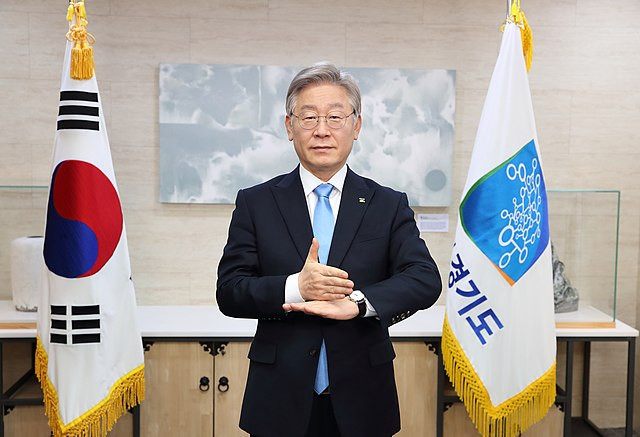In a surprising turn of events on September 21, the South Korean National Assembly approved the arrest of Lee Jae-myung, the leader of the main opposition party, the Democratic Unity Party. The decision left some lawmakers visibly shocked, with many holding their hands to their chests in disbelief.
Unexpected Approval
Prior to the vote, it was widely anticipated that the National Assembly would reject the arrest request for Lee. South Korean lawmakers enjoy immunity from arrest during their tenure, and any attempt to arrest them requires parliamentary approval. With the Democratic Unity Party holding 167 seats in the single-chamber National Assembly, the arrest request would have been nullified if party members had collectively opposed it.
This wasn't the first time prosecutors sought Lee's arrest. In February, they attempted to detain him over two corruption cases, but the request failed to pass the National Assembly.
The recent approval suggests dissenting voices within the Democratic Unity Party. This sparked outrage among Lee's supporters, some of whom attempted to storm the National Assembly building. Lee narrowly lost the presidential election last year to the current president, Yoon Seok-youl, by a margin of just 0.7%.
In response to the vote, the leadership of the Democratic Unity Party in the National Assembly announced their collective resignation on Thursday evening.
However, before their resignation, the Democratic Unity Party retaliated against Yoon's ruling People Power Party by voting to impeach Prime Minister Han Deok-soo. This marked the first time the National Assembly approved an impeachment motion against a prime minister.
Vote Details
According to the Korean News Agency, the motion to arrest Lee was passed with 149 votes in favor, 136 against, 6 abstentions, and 4 invalid votes. Out of the 295 lawmakers who participated in the anonymous vote, if all members of the ruling People Power Party, the six members of the opposition Justice Party, and four other opposition lawmakers voted in favor, at least 29 members of the Democratic Unity Party would have needed to vote in favor for the motion to pass.
Following the results, the Democratic Unity Party's spokesperson, Lee Su-yong, announced the resignation of the party's leadership in the National Assembly, expressing disappointment in the outcome.
Outside the National Assembly, hundreds of Lee's supporters gathered, with 3,700 police officers deployed. After the results were announced, some supporters tried to enter the building, while others demanded the arrest of Democratic Unity Party lawmakers who voted in favor.
On Monday, the Seoul Central District Prosecutor's Office applied to the court to arrest Lee on charges of malfeasance, bribery, violation of the Foreign Exchange Transactions Act, and instigating perjury.
Lee has denied all charges, accusing the Yoon administration of political persecution. He had previously expressed willingness to give up his parliamentary immunity, asserting his innocence and lack of fear of investigation. However, before the National Assembly vote, Lee changed his stance, accusing the prosecutors of political retaliation.
Uncertain Political Future
Following the National Assembly's approval, the Seoul Central District Court announced a hearing on September 26 to decide on Lee's arrest. However, due to Lee's health condition, his attendance remains uncertain. If Lee requests a postponement due to health concerns, the court may consider a delay after consulting with prosecutors.
If Lee is arrested, his political career could be in jeopardy. Some members of the Democratic Unity Party believe that Lee, embroiled in legal battles, should face the investigation to prevent his personal legal issues from affecting the party's approval ratings.
Before the National Assembly vote, reformist members of the Democratic Unity Party urged Lee to uphold his previous statement of waiving immunity and facing the investigation. Some lawmakers expressed concerns that Lee's hunger strike, now in its 23rd day, might be perceived as an attempt to evade arrest, potentially dragging down the party's approval ratings.
Recent polls show mixed public sentiment. A Gallup Korea poll revealed that 46% of respondents believe the prosecutors' move to arrest Lee is a legitimate corruption investigation, while 37% see it as political persecution against him. Meanwhile, President Yoon Seok-youl's approval rating remains low at 32%, with a disapproval rating of 59%.
Regardless of internal adjustments, the most crucial event for the Democratic Unity Party is next April's National Assembly election. If the party retains its position as the largest party and expands its seats, it could weaken President Yoon Seok-youl's administration.
On the day the National Assembly approved Lee's arrest, members of the Democratic Unity Party also unanimously passed a motion to impeach Prime Minister Han Deok-soo. The motion passed with 175 votes in favor, 116 against, and 4 invalid votes. However, the impeachment has no legal effect, and President Yoon can exercise his presidential power to reject it.





